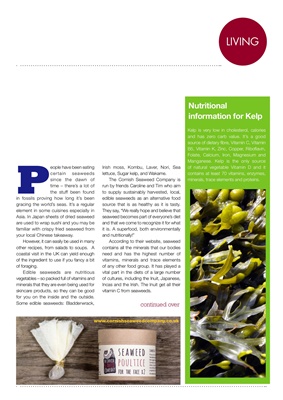
P
eople have been eating
certain seaweeds
since the dawn of
time - there's a lot of
the stuff been found
in fossils proving how long it's been
gracing the world's seas. It's a regular
element in some cuisines especially in
Asia. In Japan sheets of dried seaweed
are used to wrap sushi and you may be
familiar with crispy fried seaweed from
your local Chinese takeaway.
However, it can easily be used in many
other recipes, from salads to soups. A
coastal visit in the UK can yield enough
of the ingredient to use if you fancy a bit
of foraging.
Edible seaweeds are nutritious
vegetables - so packed full of vitamins and
minerals that they are even being used for
skincare products, so they can be good
for you on the inside and the outside.
Some edible seaweeds: Bladderwrack,
LIVING
continued over
Nutritional
information for Kelp
Kelp is very low in cholesterol, calories
and has zero carb value. It's a good
source of dietary fibre, Vitamin C, Vitamin
B5, Vitamin K, Zinc, Copper, Riboflavin,
Folate, Calcium, Iron, Magnesium and
Manganese. Kelp is the only source
of natural vegetable Vitamin D and it
contains at least 70 vitamins, enzymes,
minerals, trace elements and proteins.
Irish moss, Kombu, Laver, Nori, Sea
lettuce, Sugar kelp, and Wakame.
The Cornish Seaweed Company is
run by friends Caroline and Tim who aim
to supply sustainably harvested, local,
edible seaweeds as an alternative food
source that is as healthy as it is tasty.
They say, "We really hope and believe that
seaweed becomes part of everyone's diet
and that we come to recognize it for what
it is. A superfood, both environmentally
and nutritionally!"
According to their website, seaweed
contains all the minerals that our bodies
need and has the highest number of
vitamins, minerals and trace elements
of any other food group. It has played a
vital part in the diets of a large number
of cultures, including the Inuit, Japanese,
Incas and the Irish. The Inuit get all their
vitamin C from seaweeds.
www.cornishseaweedcompany.co.uk